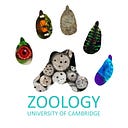Q&A with Tom Mustill (Part II 2004–5)
Could you tell us what your job as a wildlife and science film
producer/director actually involves?
I look for unusual and inspiring stories about people and animals and then persuade someone, normally the BBC, that it would be a good idea for a film to be made about them. Then, along with a team I’ve been working with for about a decade, we plan how we’re going to tell and film the story, go out and film it, come home and edit it: this whole process normally takes about 18 months. Also, less frequently, I work as a freelance Producer/ Director or camera operator.

What particular filming projects are you involved in at the moment?
I’m doing something a little different at the moment, I’m writing a book about attempts to understand the communications of animals and how new technologies might change things. At the same time, I’m making some short environmental films for the UN Sustainable Development Summit, featuring young activists, such as Greta Thunberg, who want Natural Climate Solutions to be used as part of the battle against climate change.
In what ways, if at all, did your time studying zoology here influence
your career?

It totally shaped my career
I came to Cambridge and studied biology because I love it and I wanted to spend my life learning about it and doing my bit to prevent the loss of life on earth. When I graduated I went to work as a field conservation biologist. I’d always enjoyed learning about the heroic and fascinating work of biologists, and I liked telling non-biologists about this and blowing their minds.
I came to realise that I might be able to have a bigger impact — I was at that time removing invasive species quite ineptly in a tropical forest on a remote island — if I found and told stories about the natural world, so that people would know it was in trouble and could see what could be done about it.
At that time there were very few films about conservation that weren’t totally depressing and that were on prime time television. UK and International nature and science TV broadcasters were almost silent about climate change
I still spend most of my time reading, writing or talking about zoology — like an extended Zoology Happy Hour. My job is to make sure that the work of biologists is understood and that people care.
Did anything in particular happen to you when doing Part II that still
sticks in your memory?
I met the friends that I still have today: we were a weird and unruly bunch, and we were thrown together and forged as a group by the course. The most notable thing that happened to me was being taken on as the research assistant for a visiting Russian palaeontologist. I spent three summers going to remote parts of Russia, being dropped in the arctic by helicopter, and rafting through the Ural mountains. We discovered vast numbers of rare precambrian fossils and for my Part II project I was able to use stats tools honed in forest ecology and apply them to trying to figure out what these half a billion year old life forms might have been up to. It was interdisciplinary and wonderful and, looking back, an amazing piece of luck.
What are you most proud of that you have achieved so far in your career?
I got a letter from David Attenborough a couple of months ago. He’d watched my most recent film, which was about finding new ways of telling stories about nature and conservation, using new narrative devices and editing techniques. Awards, reviews and good viewing figures are nice, but he is the reason I got into this, and the letter he wrote has given me immense motivation to keep trying what I’m trying.

What is the most important piece of advice that you would give to a
zoology graduate who is contemplating a career in wildlife filming and
presentation?
Go for it. We’re living through a mass extinction that we can fight to prevent. We are discovering wonderful and life-changing things about the natural world that most people have no idea about. We need scientifically literate storytellers with passion. I’d add a caveat. There are already enough boring wildlife films and presenters flying around the world saying the same old stuff and filming the same animals. Don’t opt for this career if it would just be a job, or an excuse to travel: do it because you care about the natural world and because you have something to say.
Is there a wildlife film series or programme from the past that you
would really like to have been involved in yourself?
I’d have loved to be on Planet Earth 1 and to have somehow got some more Climate Change into it, perhaps we’d have taken things seriously sooner.
For adventure — anything involving the deep sea, I would love to go there. The camaraderie of the work is the best part. Being part of Jaques Cousteau’s team looked wild — I’d have liked flying around in his microlites, though my mother would not have liked that.
Who would you like to play you in a film about your life?
If, when I am older, I get to do something important, I would like to be played by Meryl Streep with a good special effects team.
Ideal evening out??
A meal in a warm pub with good friends after a long cold winter surf.
